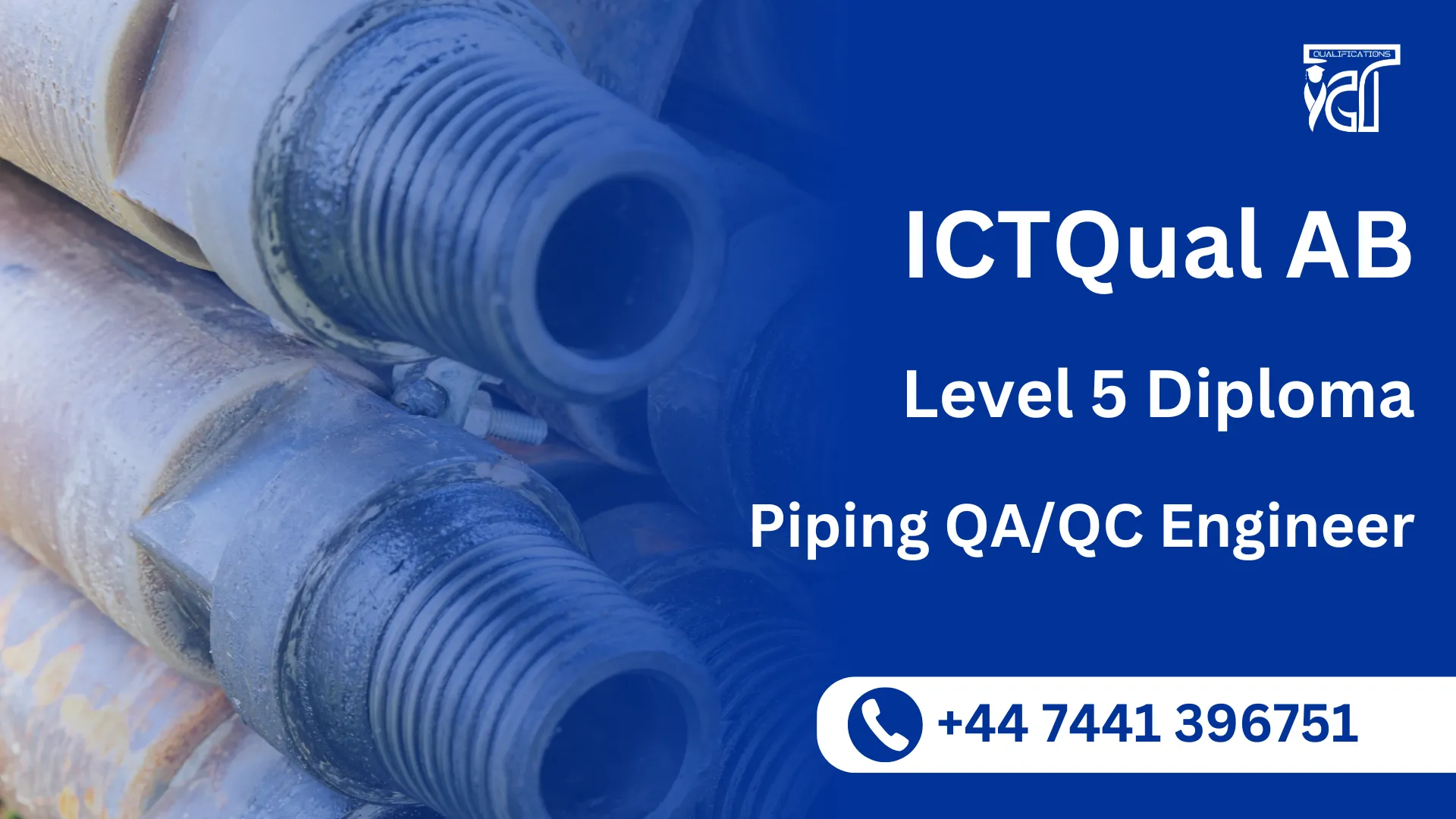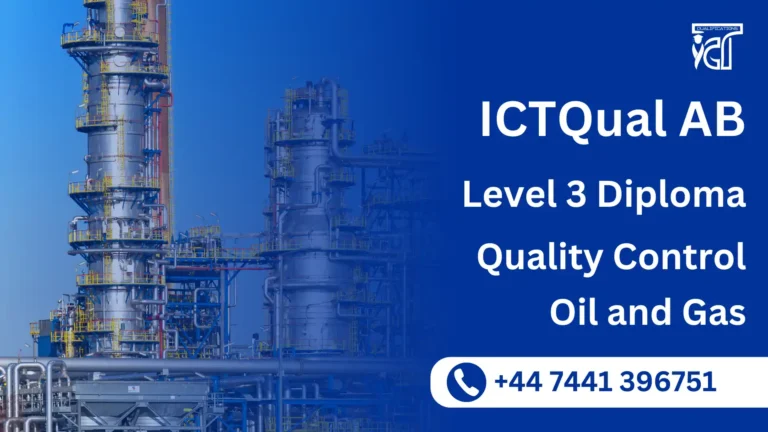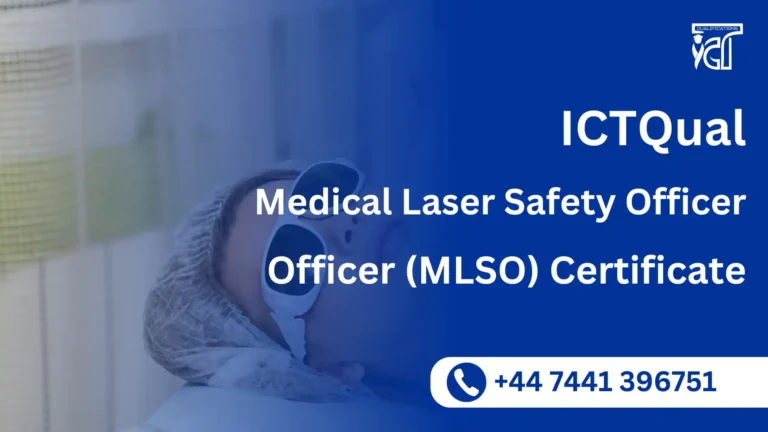The ICTQual AB Level 5 Diploma in Piping QA/QC Engineer is designed to provide learners with a solid foundation in the principles and practices of quality assurance and quality control within piping engineering. This program equips participants with the essential knowledge and skills required to ensure that piping systems meet industry standards, safety regulations, and project specifications.
Learners will explore key areas such as material selection, fabrication processes, welding inspection, and non-destructive testing (NDT). The course emphasizes practical application, enabling participants to understand inspection procedures, documentation requirements, and compliance frameworks used across oil and gas, petrochemical, power generation, and construction industries.
By focusing on both theoretical concepts and applied techniques, the diploma prepares learners to take on responsibilities in monitoring quality systems, identifying defects, and ensuring the integrity of piping installations. It also develops problem-solving and analytical skills that are critical for maintaining safety and efficiency in engineering projects.
Completing this qualification positions learners for career opportunities in QA/QC engineering, inspection, and project quality management. It serves as a stepping stone toward advanced diplomas and higher-level certifications, while also enhancing employability in global industries where piping QA/QC expertise is highly valued.
ICTQual AB Level 5 Diploma in Piping QA/QC Engineer
This qualification, the ICTQual AB Level 5 Diploma in Piping QA/QC Engineer, consists of 6 mandatory units.
| Sr# | Unit Title |
| 1 | Construction Quality Assurance in Process Piping Projects |
| 2 | Evaluation of Welding Defects and Acceptance Criteria |
| 3 | Project Documentation Control and Quality Audits |
| 4 | In-Depth Review of International Piping Codes and Regulations |
| 5 | Supervision and Leadership in QA/QC Teams |
| 6 | Risk Management and Safety Compliance in QC Operations |
Learning Outcomes for the Study Units:
Construction Quality Assurance in Process Piping Projects
- Evaluate the principles of quality assurance (QA) applied during process piping construction, distinguishing QA from QC activities training.
- Develop inspection plans and control measures to guarantee alignment with project specifications and industry benchmarks.
- Supervise QA processes to ensure defect prevention and compliance throughout the construction lifecycle.
Evaluation of Welding Defects and Acceptance Criteria
- Identify and classify welding defects using established acceptance standards.
- Assess weld quality by referencing typical criteria from international codes such as ASME and API.
- Recommend appropriate corrective actions when identifying non-conformities.
Project Documentation Control and Quality Audits
- Apply document control best practices to maintain traceability and manage quality records.
- Plan and conduct internal quality audits to verify compliance with contract requirements and established quality systems.
- Analyse audit outcomes and support the implementation of corrective and preventive actions.
In‑Depth Review of International Piping Codes and Regulations
- Demonstrate advanced understanding of critical piping codes, such as ASME B31.3, API standards, and ISO 9001 frameworks at a Level 5 standard.
- Interpret and apply code requirements to ensure regulatory compliance throughout inspection and QC documentation.
- Evaluate how evolving code updates influence QA/QC decision-making in piping projects.
Supervision and Leadership in QA/QC Teams
- Showcase leadership competencies for supervising QA/QC teams during fabrication and erection phases.
- Allocate inspection tasks effectively and manage team communication to ensure consistent quality control.
- Mentor junior personnel in inspection protocols, code compliance, and documentation standards.
Risk Management and Safety Compliance in QC Operations
- Apply risk assessment tools to identify and prioritise safety and quality hazards in piping activities.
- Integrate risk mitigation strategies aligned with ISO methodologies and risk-based inspection (RBI) principles.
- Monitor safety compliance and adapt QA/QC practices to support continuous improvement and workplace safety.
The ICTQual AB Level 5 Diploma in Piping QA/QC Engineer provides learners with a strong foundation in piping inspection, quality assurance, and compliance. This program is designed to build essential technical skills while preparing participants for career growth in industries where safety and reliability are critical.
Technical Knowledge and Skills
- Solid understanding of QA/QC principles applied to piping systems
- Knowledge of international codes and standards such as ASME, API, and ISO
- Introduction to welding inspection and fabrication monitoring techniques
- Basic application of non-destructive testing (NDT) methods
- Awareness of material selection and compliance requirements
- Development of documentation and reporting skills for inspection processes
Practical Industry Application
- Exposure to inspection procedures used in oil, gas, and construction projects
- Ability to identify defects and apply corrective measures under supervision
- Training in monitoring fabrication and installation of piping systems
- Understanding of safety standards and risk management practices
- Preparation for real-world QA/QC challenges in industrial environments
- Skills to support senior engineers and inspection teams effectively
Career Opportunities and Progression
- Entry into QA/QC roles in engineering and construction sectors
- Pathway to positions such as Junior QA/QC Engineer or Piping Inspector
- Recognition as a qualified professional in piping inspection
- Foundation for progression to Level 6 and Level 7 diplomas
- Enhanced employability in global industries requiring QA/QC expertise
- Competitive advantage in securing technical inspection roles
Professional Growth and Development
- Strengthening of analytical and problem-solving abilities
- Improved communication and teamwork skills for project environments
- Confidence in applying QA/QC procedures to practical scenarios
- Motivation to pursue advanced certifications in welding or NDT
- Capacity to contribute to quality systems and compliance frameworks
- Preparation for continuous professional development in engineering fields
The ICTQual AB Level 5 Diploma in Piping QA/QC Engineer is designed for learners who wish to strengthen their foundation in piping inspection, quality assurance, and compliance. The ideal participant is motivated to build technical knowledge, gain practical skills, and prepare for career progression in industries where safety and quality are essential.
Academic and Technical Background
- Learners with a basic qualification in engineering or technical studies
- Participants who have completed Level 4 diplomas or equivalent training
- Individuals with exposure to mechanical, civil, or industrial disciplines
- Candidates familiar with basic fabrication or inspection processes
- Learners with secondary education and interest in technical careers
- Good command of English for technical communication and documentation
Professional Aspirations
- Aspiring QA/QC engineers seeking to enter the piping inspection field
- Technicians and site workers aiming to move into quality-focused roles
- Supervisors wishing to strengthen their knowledge of QA/QC procedures
- Learners targeting industries such as oil and gas, petrochemicals, and construction
- Professionals seeking recognized qualifications to boost employability
- Individuals motivated to progress toward advanced diplomas in QA/QC engineering
Skills and Competencies Desired
- Interest in welding inspection and fabrication monitoring
- Ability to understand and apply compliance frameworks
- Commitment to safety standards and risk management practices
- Willingness to learn non-destructive testing (NDT) methods
- Capacity to manage basic documentation and reporting tasks
- Desire to develop analytical and problem-solving skills
Personal Qualities and Motivation
- Detail-oriented learners who value accuracy and precision
- Motivated individuals eager to build a career in QA/QC engineering
- Team players able to collaborate in project environments
- Problem-solvers who thrive in technical and industrial settings
- Learners committed to continuous improvement and professional growth
- Individuals seeking a pathway to higher-level qualifications and leadership roles
Completing the ICTQual AB Level 5 Diploma in Piping QA/QC Engineer provides learners with a strong foundation to advance academically and professionally. This qualification serves as a stepping stone toward higher-level diplomas, specialized certifications, and career opportunities in industries where piping QA/QC expertise is essential.
Academic and Professional Development
- Progression to Level 6 Diploma in Piping QA/QC Engineer
- Eligibility for advanced diplomas in engineering quality management or project inspection
- Opportunity to pursue specialized certifications in welding inspection and non-destructive testing (NDT)
- Access to professional memberships in engineering and inspection associations
- Recognition for further study in technical management or compliance programs
- Foundation for continuous professional development (CPD) in engineering disciplines
Career Pathways
- Entry into QA/QC Engineer roles in oil and gas, petrochemical, and construction industries
- Opportunities as Junior Inspection Engineer or Piping Inspector
- Support roles in project quality coordination and documentation control
- Career progression into supervisory positions with experience
- Enhanced employability in global industries requiring QA/QC expertise
- Pathway to consultancy roles in inspection and compliance
Industry Specialization
- Development of expertise in piping systems and fabrication monitoring
- Specialization in welding inspection techniques for industrial projects
- Application of NDT methods for safety-critical environments
- Integration into risk management and compliance frameworks
- Opportunities to work on large-scale energy and infrastructure projects
- Contribution to innovation in QA/QC practices and inspection systems
Long-Term Professional Growth
- Pathway to senior roles such as QA/QC Supervisor or Project Quality Coordinator
- Enhanced credibility for international assignments and cross-border projects
- Capacity to mentor and support junior inspectors within organizations
- Potential to transition into advanced academic or training roles in QA/QC engineering
- Strengthened profile for leadership in safety and compliance management
- Future readiness for evolving industry standards and technological advancements
Entry Requirements
Learners must meet the following criteria to be considered for admission into the course:
- Age Requirement: Minimum age of 18 years at the time of enrollment
- Educational Background: Completion of secondary school education or equivalent qualification
- Work Experience: 1–2 years of industry experience in piping, welding, or inspection preferred
- English Language Proficiency: Good command of English for technical communication and documentation. Recommended proficiency equivalent to CEFR B1 or IELTS 5.0
Register Now
Qualification Process
Qualification Process for the IICTQual AB Level 5 Diploma in Piping QA/QC Engineer
- Self-Assessment:
Begin by evaluating your eligibility to ensure you meet the qualification requirements, including work experience, knowledge, and language proficiency. - Registration:
Complete your registration by submitting the required documents, including a scanned copy of a valid ID, and paying the registration fee. - Induction:
An assessor will conduct an induction to confirm your eligibility for the course and explain the evidence requirements. If you do not meet the criteria, your registration will be cancelled, and the fee will be refunded. - Assignments & Evidence Submission:
Provide all assignments and the necessary evidence based on the assessment criteria outlined in the course. If you are unsure of the required evidence, consult with the assessor for guidance on the type and nature of evidence needed. - Feedback and Revision:
The assessor will review your submitted evidence and provide feedback. Evidence that meets the criteria will be marked as “Criteria Met,” while any gaps will be identified. You will be asked to revise and resubmit if needed. - Competence Evidence:
Submit final evidence demonstrating that all learning outcomes have been met. This evidence will be marked as “Criteria Met” by the assessor once it is satisfactory. - Internal Quality Assurance (IQA):
The Internal Quality Assurance Verifier (IQA) will review your evidence to ensure consistency, quality, and compliance with standards. - External Verification:
The IQA will submit your portfolio to ICTQUAL AB External Quality Assurance Verifiers (EQA) for final confirmation. The EQA may contact you directly to verify the authenticity of your evidence. - Certification:
Upon successful completion of all checks, ICTQUAL AB will issue your official certificate, confirming that you have attained the ICTQual AB Level 5 Diploma in Piping QA/QC Engineer






